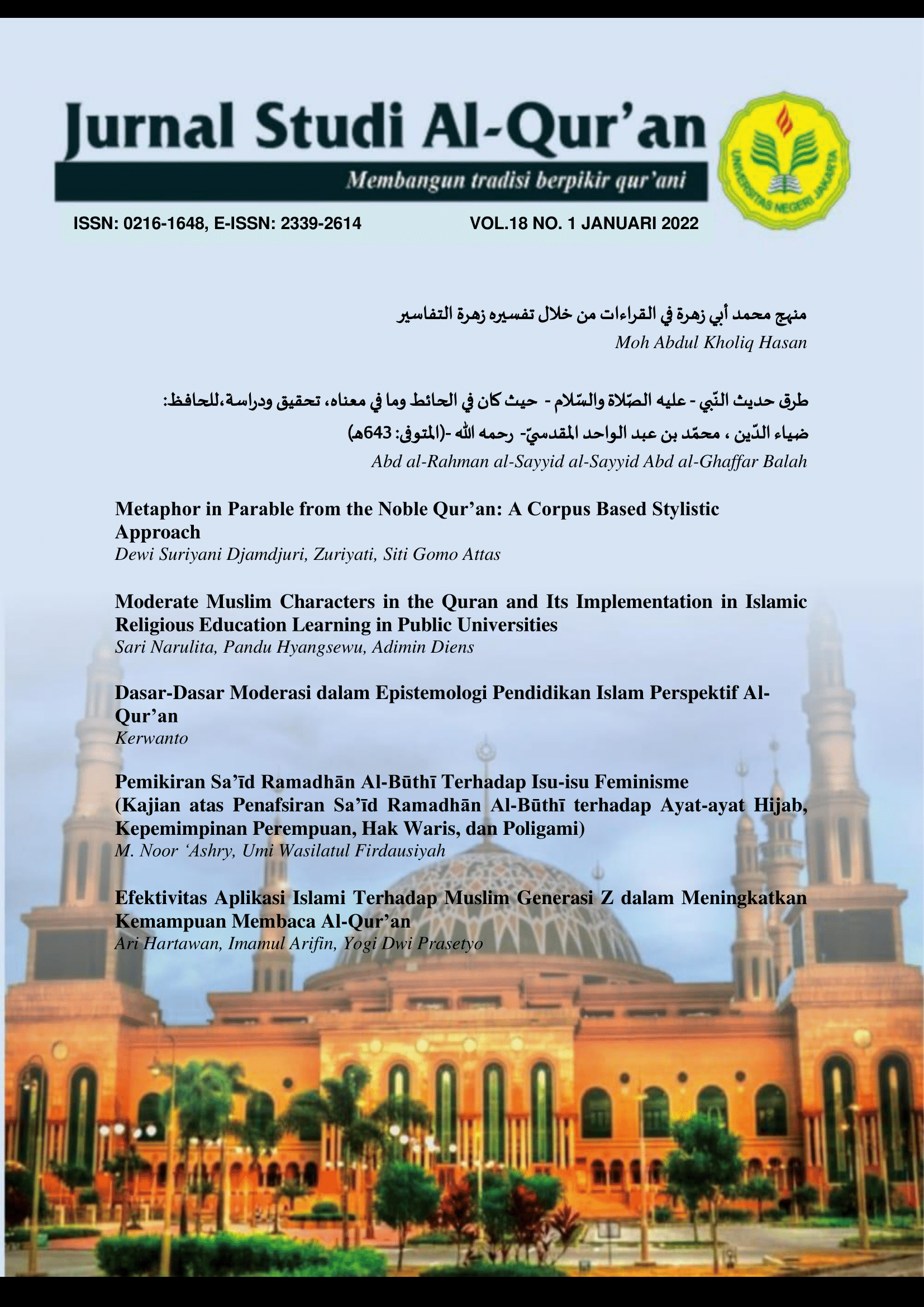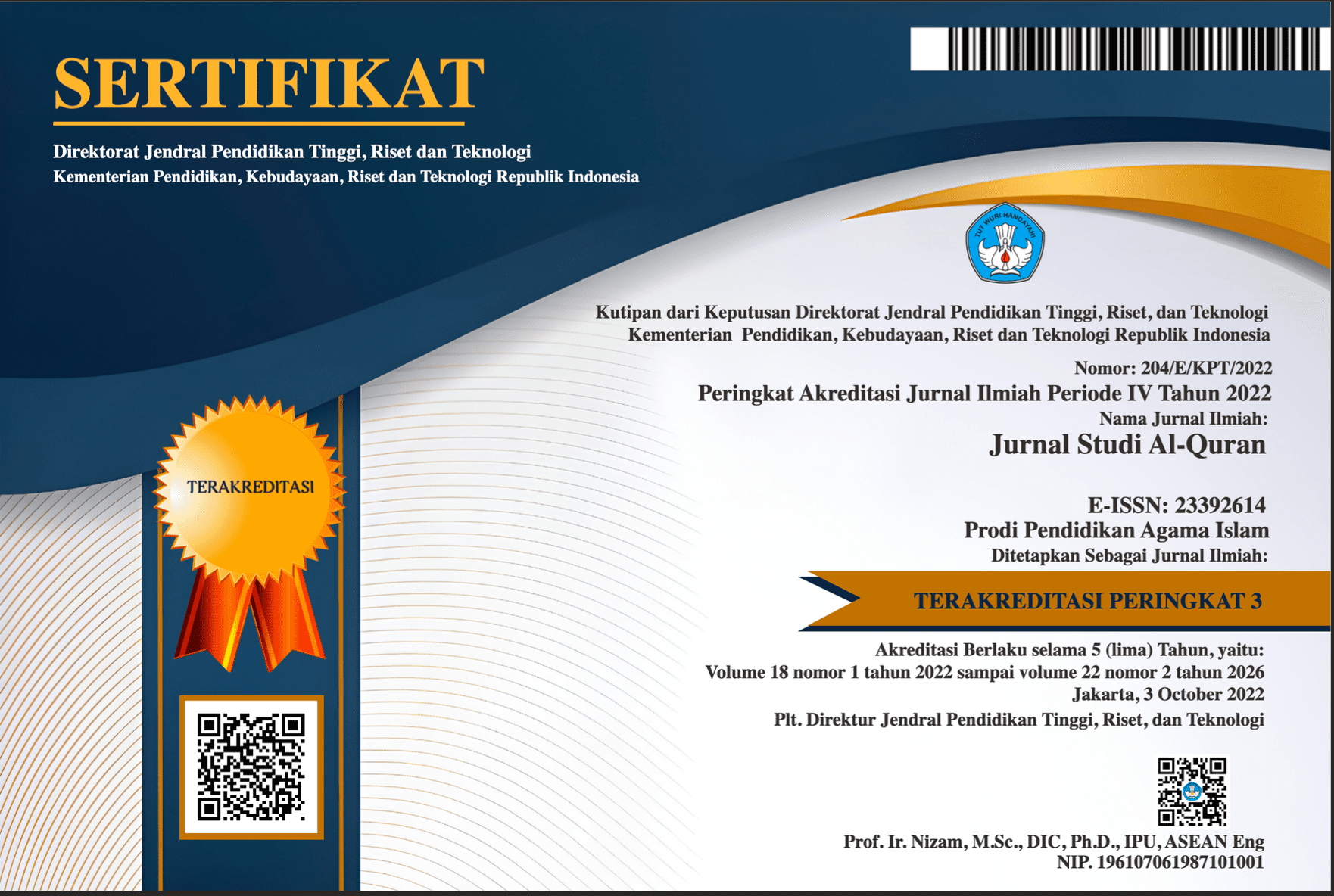Moderate Muslim Characters in The Quran and Its Implementation in Islamic Religious Education Learning in Public Universities
DOI:
https://doi.org/10.21009/JSQ.018.1.04Keywords:
Muslim Moderat, Quran, PAIAbstract
Actions of radicalism and terrorism have hurt Muslims and placed them at fault. The teachings of jihad in Islam are often the target of accusations of being the leading cause of violence in the name of religion. Many Islamic teachings direct a Muslim to be moderate. This article explains the verses and hadiths related to Moderate Islam's character and describes the implementation process in PAI learning in public universities. This research is qualitative research by reviewing the verses of the Quran and hadith and observations on the implementation process through Islamic learning in several universities on the island of Java. The results show that the characteristics of moderate Muslims in the Quranic hadith lead to Muslims who can balance their attitudes and views. At the same time, the implementation process is realized through the PAI curriculum, which contains Islamic moderation values, supported by moderate lecturers, which directs students to understand Islamic teachings textually and contextually.
References
Bruinessen, Martin van. Contemporary Developments in Indonesian Islam Explaining the "Conservative Turn. Singapore: ISEAS, 2013.
Effendi, M. R. (2020). Mitigasi Intoleransi dan Radikalisme Beragama di Pondok Pesantren Melalui Pendekatan Pembelajaran Inklusif. Paedagogie, I (I), 55–74.
Hadiyanto, Andy, M Ridwan Effendi, Sari Narulita, and Firdaus Wajdi. Pendidikan Agama Islam Untuk Perguruan Tinggi. Jakarta: Fikra Publika, 2020.
Ismail, Y. (2019). Postmodernisme dan Perkembangan Pemikiran Islam Kontemporer. Jurnal Studi Al-Qur’an , 15(2), 235 - 248.
Ismail, Y. (2015). Pendidikan Agama Islam Berbasis Teologi Kerja. Jurnal Studi Al-Qur’an , 11(1), 70-81
Kementrian Agama RI, Badan Litbang & Diklat. Moderasi Beragama. Jakarta: Kementrian Agama RI, 2019.
Laisa, Emna. “Islam Dan Radikalisme.” Islamuna 1, no. 1 (2014): 1–18.
Mushlihin, M., Narulita, S., & Aulia, R. N. (2021). Education and the formation of Islam Nusantara: Epistemology, Direction and Sustainability. Hayula: Indonesian Journal of Multidisciplinary Islamic Studies, 5(2), 261-270.
Muttaqien, A., Hadiyanto, A., & Mardhiah, I. (2016). Pengarusutamaan Islam Nusantara Melalui PAI dalam Perspektif Dosen PAI UNJ. Jurnal Studi Al-Qur'an, 12(1), 1-21.
Narulita, Sari, Rihlah Nur Aulia, Elisabeth Nugrahaeni, Firdaus Wajdi, Izzatul Mardhiah, and Andy Hadiyanto. "Religion Learning Strategies for the Z Generation." In 1st International Conference on Education Social Sciences and Humanities (ICESSHum 2019), 870–875, 2019.
Nurdin, Fauziah. “Moderasi Beragama Menurut Al-Qur’an Dan Hadist.” Jurnal Ilmiah Al-Mu’ashirah: Media Kajian Al-Qur’an dan Al-Hadits Multi Perspektif 18, no. 1 (2021): 59–70. https://www.jurnal.ar-raniry.ac.id/index.php/almuashirah/article/view/10525.
NURPRATIWI, Suci; EFFENDI, Muhamad Ridwan; AMALIYAH, Amaliyah. Improving Religious Literacy Through Islamic Religious Education Course Based On The Flipped Classroom. Istawa : Jurnal Pendidikan Islam, [S.l.], v. 6, n. 1, p. 16-29, mar. 2021. ISSN 2541-0970.
Pew Research Center. The Global God Divide, 2020. https://www.pewresearch.org/global/2020/07/20/the-global-god-divide/.
Siti Julaeha, E., Ridwan Effendi, M., & Karnafi. (2021). Everyone is Teacher Here Method and Its Effectiveness On Learning Outcomes of Akidah Akhlak. Muttaqien Publishing, 1(1), 91–104.
Downloads
Published
How to Cite
Issue
Section
License
Authors who publish with this Journal agree to the following terms:
- Author retain copyright and grant the journal right of first publication with the work simultaneously licensed under a creative commons attribution licensethat allow others to share the work within an acknowledgement of the work’s authorship and initial publication of this journal.
- Authors are able to enter into separate, additional contractual arrangementfor the non-exclusive distribution of the journal’s published version of the work (e.g. acknowledgement of its initial publication in this journal).
- Authors are permitted and encouraged to post their work online(e.g. in institutional repositories or on their websites) prior to and during the submission process, as it can lead to productive exchanges, as well as earlier and greater citation of published works.
Users/public use of this website will be licensed to CC BY









